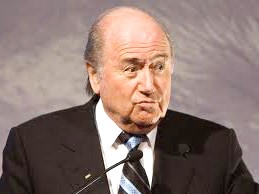(Reuters) – A U.S. Senate panel invited FIFA President Sepp Blatter to answer questions at a hearing today about the corruption scandal that has badly tarnished soccer’s global governing body but FIFA declined on his behalf, a congressional official said.
“Sen. Moran’s office reached out to FIFA to explore the possibility of having Mr. Blatter testify but the organization declined,” said Garrette Turner, spokesman for Senator Jerry Moran, the Republican chairman of the consumer protection subcommittee, which is holding the hearing.

FIFA did not immediately respond to a request for comment and Blatter’s legal representative in the U.S. declined to comment.
Blatter said last week in an interview with German newspaper Welt am Sonntag that he “won’t take any travel risks until everything has been cleared up”.
The 79-year-old Swiss national did not attend the final of FIFA’s Women’s World Cup in Vancouver earlier this month but says he intends to be in Russia in late July for the draw for qualifying games for the 2018 World Cup.
Also missing from the hearing will be U.S. Soccer Federation (USSF) top elected official, President Sunil Gulati, who is a member of FIFA’s executive committee representing the North America region. He has been USSF president since 2006.
The USSF will be represented instead by CEO and Secretary General Dan Flynn.
Senator Moran’s office said that Flynn was “the highest ranking official U.S. Soccer was willing to send” to testify at the hearing.
The USSF did not respond to a question from Reuters about why Flynn and not Gulati was appearing.
The three other witnesses are Michael Hershman, a private investigator who served on FIFA’s independent governance committee from 2011 to 2013, Sunjeev Bery, an official of Amnesty International, and Andrew Jennings, a British investigative journalist who led efforts to expose corruption in FIFA.
Senators will ask what if anything, current American soccer executives knew about alleged corruption in the sport’s governing bodies, congressional aides said.
Former U.S. soccer official Chuck Blazer, who was a FIFA executive committee member for 17 years, has been at the center of the corruption scandal. He has pleaded guilty to a series of offences related to bribery and is cooperating with authorities.
SPONSORS’ ROLE
The subcommittee will also explore what role and responsibilities corporate sponsors do and should play in the governance of the world’s most popular sport, the aides said.
In late May, federal prosecutors in Brooklyn, New York indicted nine soccer officials, most of whom held FIFA positions or had previously held such positions, and five sports media and promotions executives in schemes involving $150 million in bribes over a period of 24 years. Prosecutors said their investigation exposed complex money laundering schemes, millions of dollars in untaxed income and tens of millions of dollars in offshore accounts held by the soccer officials.
The indictment included reference to an unnamed sportswear company that has been widely identified as Oregon-based Nike Inc . The indictment references payments made in “marketing fees” to the Brazilian national soccer federation, that were not in the company’s initial contract.
Nike said there is no allegation in the indictment that it engaged in criminal conduct.
Congressional aides said senators are likely to ask witnesses detailed questions about what U.S. soccer officials knew about the kind of corruption and dysfunction inside FIFA and its regional affiliates. In particular, they will want to know what the officials did or did not do about it, and what they plan to do to clean up the sport, the aides said.
